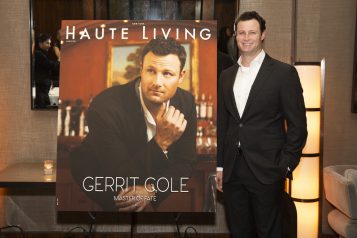“I began working professionally in whatever productions were offered me.” His role as Goldie Hawn’s love interest in 1980’s Private Benjamin secured his place as one of the film industry’s elite.
Hollywood. Go on, say it out loud. Hollywood. It just sounds glamorous, and the name is as sophisticated as the surroundings, which attracts those destined to be stars and those merely hoping to be like moths to a flame. The three syllables conjure up images of glamour, of seduction, of bright lights and rolling cameras and action! But Armand Assante…he didn’t want that.
Oh, it wasn’t the action, nor was it the rolling cameras that kept the actor firmly rooted on the other side of the country in his native New York. Those, he coveted. The lights of the stage captivated him at an early age, generating notoriety for himself as a drummer when he was merely 14. At the age of 17, he entered the American Academy of Dramatic Arts and was subsequently accepted into a music school for opera, soon finding solace in the theater.
But even now, 30 years and countless roles-both bit and starring-later, he is not a headline-courting actor touting the accords of the industry, one who will take any role in any blockbuster film in order to have his name splashed across billboards and his likeness formed into an action doll. Assante is an artist. He is at home in the countryside of upstate New York, some 3,000 miles away from the center of his industry. It was a calculated choice; Assante did not chase Hollywood.
Throughout his career, Assante has carefully selected projects based on a role’s integrity, its impact. As such, while his moniker might not be a household one, his face is more than simply recognizable, and he is lauded as one of the few working actors who consistently give a strong performance, regardless of genre, despite a rough start.
“Acting did not come easy for me,” he explains, “because music was my forte. But acting became absolutely consuming, music faded into the background, and I became a full-time actor.” Assante worked for 10 years in the theater before making the transition to films and television.
He entered Hollywood during what he refers to as the “commercial worker days of films.” He made his silver screen debut in 1974 in The Lords of Flatbush where he played a wedding guest. The small role was followed by films such as Paradise Alley, Prophecy, and Little Darlings. During this time, he was also a regular on two NBC soap operas. “I was actually spoiled by Hollywood because I could work lucratively,” he explains. “I began working professionally in whatever productions were offered me.” His role as Goldie Hawn’s love interest in 1980’s Private Benjamin secured his place as one of the film industry’s elite.
But it was around that time that he discovered his love for the independent film, for the anti-Hollywood blockbuster. This genre has since defined his career, as he relished roles in films such as Belizaire the Cajun, Stranger in my Bed, Deadly Business, and Hands of a Stranger. Along the way, he racked up a slew of awards and nominations, including Best Supporting Actor for Q&A in 1991 and Best Performance by an Actor in a Supporting Role in a Series, Mini-Series, or Motion Picture Made for Television in 1997 for Gotti. These films were bookended by some major rolls in the likes of The Mambo Kings, 1492: Quest for Paradise, and, most recently, American Gangster, where he starred alongside Denzel Washington.
While one could expect that the higher profile roles would be the ones that brought the actor the most satisfaction, Assante prides himself on his artistic integrity, which he feels he is more able to explore in smaller films, as opposed to big budget blockbusters. “The real rewards for me have come out of most of the independent work I have done with the filmmakers,” he explains.
He has been working steadily, either filming or preparing for a role, nearly non-stop for 30-some odd years. Between 2000 and 2003, he completed six independent projects while also filming Citizen Verdict opposite Jerry Springer in 2002 and Dot.Kill in 2003. He then filmed Two for the Money with Al Pacino and Funny Money with Chevy Chase. He is consistently chugging along with the stamina of a bull, making film after film, honing his skill. And now, when he is at the top of his game, he is about to make a bold move that will shift him behind the camera, although the details are a bit scarce. He doesn’t want to make any promises he can’t keep. “A lot of people tend to talk about the future as if it’s the present,” he states, a troubling trend in an industry that so often hypes projects that don’t ever see the light of day. Right now, a quick look at Assante’s IMDB page lists 11 projects in various stages of production, yet the actor will only confirm involvement in a few, stating that people like to adhere his name to projects to lend some weight in hopes that the film could get the funding needed to get it out of the gate.
“I don’t like to talk about what could be done,” he says. “I feel that in the times we are in, it’s not a good situation for people to be guaranteeing that something is going to get launched. Even some of the bigger filmmakers in the world are finding insurmountable problems getting things going because people worldwide have lost confidence in the economy. In the film industry, the cost of marketing and distribution has skyrocketed, so in reality, even a small budget film is going to cost $10 million, just to get it out of the gate.”
So while he is hesitant to give the details of what the near future has in store for him, he will continue to approach each project with the passion that he is known for. Assante is fiercely loyal, even to a fault. “I had a psychiatrist who told me 20 years ago that I had a responsibility conflict. He said that if I continue with my heart-felt responsibility towards my family and friends that I’m eventually going to drop dead.”
“I owe it to Hollywood in that they gave me enough recognition to do that, and I am very thankful for this.”
His loyalty also applies to his roots. His allegiance to the state in which he was born and raised played a major factor in his decision to forgo the Hollywood route. Assante is from Manhattan, and a strong affinity for the city still courses through his veins. He could never escape its magical pull, but he also craves silence, solitude. He chose to settle on a farm in Orange County because he needed a space that would allow him to indulge his rugged side. Assante is an avid outdoorsman, a breeder of horses and German shepherds. “I love using my body,” he says, “and I feel that since I am a hard worker, I have really helped my longevity as an actor.”
His brawny persona has been reflected in a number of his roles. His portrayal of crime boss John Gotti, the role as private eye in I, the Jury, or as a mafia gangster in Sidney Sheldon’s Rage of Angels: these tough-guy hero-type characters resonate with the actor, although he says the role he most relates with is his part as Cmdr. Dwight Towers in Showtime’s On the Beach, which received a Golden Globe nomination for Best Mini Series in 2000.
While he may have forgone the typical Hollywood route, his acting career has given him a platform in which to reach countless individuals and help them overcome their personal plights. “I owe it to Hollywood in that they gave me enough recognition to do that, and I am very thankful for this.” Outside of the non-stop career moves, Assante is a passionate philanthropist, and he has combined his love for film with his personal crusades. He is a landmine removal activist and has spent a significant amount of time writing and directing a documentary on the subject. Blind Dragon was forced to stop filming in 2003 because of funding issues, but it is a topic that he is still actively pursuing.
While filmgoers can still expect to see Assante’s mug on the big screen in more roles, it won’t be long before his name is scrolling the credits as producer or director. Regardless of the role he takes, audiences can count on Assante to approach the job with the same heartfelt intensity and artistic integrity he has been bringing to the film industry for the past three decades.





















